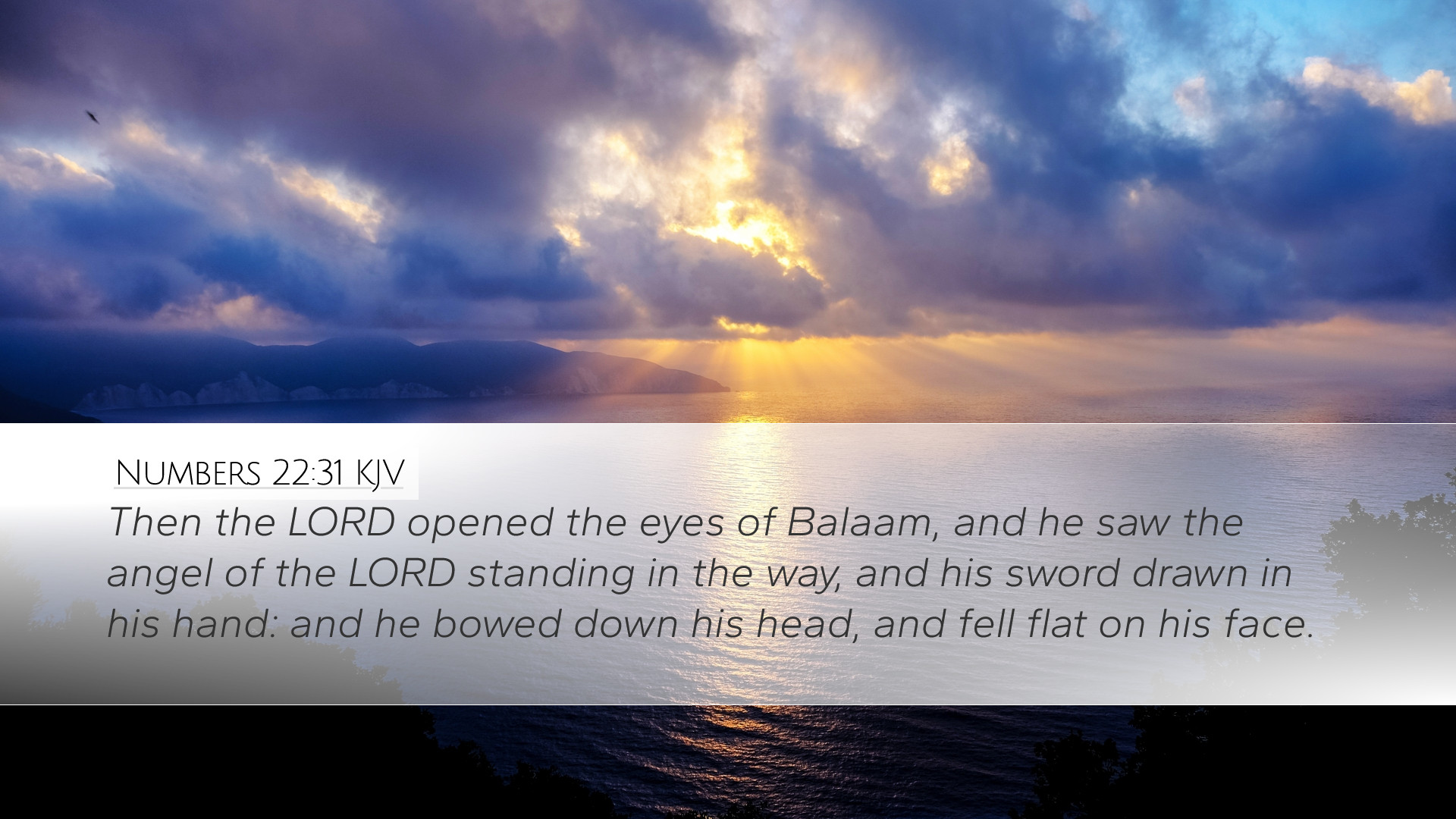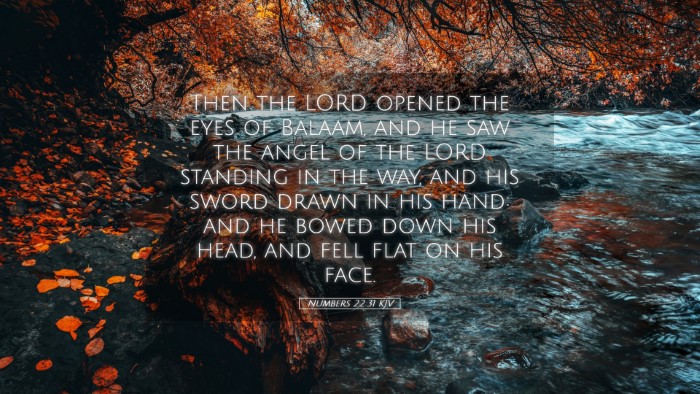Commentary on Numbers 22:31
Numbers 22:31 reads: "Then the LORD opened the eyes of Balaam, and he saw the angel of the LORD standing in the way, with his sword drawn in his hand: and he bowed down his head, and fell flat on his face."
Introduction
This verse is a pivotal moment in the narrative concerning Balaam, a prophet whose actions and motivations raise essential questions about divine instruction and human free will. Exploring this verse through the insights of respected commentators reveals profound theological implications relevant for both contemporary readers and scholars.
Contextual Overview
Balaam, called to curse Israel by Balak, king of Moab, finds himself in a precarious moral and spiritual situation. The preceding verses detail Balaam's interactions with God, who is initially clear in His command to abstain from cursing the Israelites. The angel of the Lord intervenes at a crucial moment, revealing the complexity of divine oversight in human affairs.
Theological Insights from Public Domain Commentaries
Matthew Henry's Commentary
Henry emphasizes the opening of Balaam's eyes as a significant act of divine grace. He notes that "the Lord opened the eyes of Balaam" not merely for physical sight but for spiritual perception. This moment signifies a pivotal turning point in Balaam's understanding of God’s will.
- Divine Intervention: Henry highlights that the angel's appearance symbolizes God's active involvement in our lives, serving as a reminder that **God controls the course of events** even when human intentions deviate from His purpose.
- Humility in Worship: Balaam's reaction—bowing down and falling on his face—illustrates the appropriate response to the divine. Henry points out that in recognizing God's sovereign authority, "there is a need for humility."
Albert Barnes' Notes on the Bible
Barnes provides a rich analysis of the implications of this divine revelation. He notes that "the angel of the Lord standing in the way" reflects a critical moment where God's intentions intersect with Balaam's path.
- Symbolism of the Sword: Barnes elaborates on the sword as a symbol of God's judgment and justice. It signifies that Balaam's actions are under divine scrutiny and that he is on dangerous ground spiritually.
- Moral Responsibility: Furthermore, Barnes stresses Balaam's moral responsibility, highlighting that even though the angel blocked his path, the awareness of divine oversight does not absolve Balaam of his choice to heed or ignore God’s direction.
Adam Clarke’s Commentary
Clarke's commentary brings additional insights into the narrative's ethical dimension. He focuses on the importance of perceiving God’s restrictions as blessings rather than hindrances.
- Spiritual Blindness: Clarke explicates that Balaam's earlier inability to see the angel indicates a state of spiritual blindness, akin to many who pursue personal gain over divine guidance. This serves as a cautionary tale for pastors and theologians regarding **the need for spiritual discernment**.
- Purposeful Adversity: In addition to opening Balaam's eyes, God uses adversity (the angel's presence) to redirect Balaam's path. Clarke underscores the idea that challenges may often usher us into deeper insight and greater alignment with God's purpose.
Applications for Pastors and Theologians
This verse conveys essential truths awaiting exploration in preaching and teaching contexts. The following applications can be drawn from the insights of these commentators:
- Awareness of Divine Guidance: Believers must cultivate sensitivity to God's leading, regularly seeking His insight in prayerful reflection. Lessons from Balaam remind us that straying from divine commands can lead to grave consequences.
- The Importance of Humility: Just as Balaam responded in humility upon seeing the angel, we too need to approach God with a spirit of repentance and reverence, acknowledging His sovereignty over our lives.
- Moral Accountability: Clergy should highlight the critical concept of moral responsibility, emphasizing that receiving divine revelation requires a commitment to obedience.
- Cultivating Spiritual Discernment: Theological education should stress the need for spiritual discernment to counteract the pervasive blindness that may arise from pursuing personal ambition over God's directives.
- Encouragement in Adversity: Pastors can encourage congregants to view obstacles as opportunities for growth and redirection, reinforcing the message that God often uses challenging circumstances to prompt deeper faith and obedience.
Conclusion
Numbers 22:31 serves as a profound illustration of God's providence and the complexity of human decision-making. Through the insights of Matthew Henry, Albert Barnes, and Adam Clarke, this commentary encapsulates the multifaceted themes of divine oversight, moral responsibility, and the necessity of humility in worship. As pastors, students, and scholars engage with this verse, may they find renewed encouragement to pursue God’s will with sincerity and discernment.


